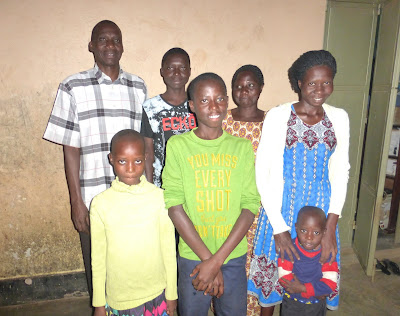Truth be told, I didn’t give much of my free time to reading
as a child. I was too busy sloshing
around in the creek or playing some game of sport. Remember Kick the Can? I spent hours trying to perfect my play in
that game. Sometime in my later teens books and reading became good friends to
me. Eldridge Cleaver’s Soul On Ice talked to me in a way books before this did
not. The books Karen and I have read while in Africa have added greatly to our
understanding and experience here. We
devoted an earlier blog post to what we were reading at the time. We’d like to update our reading list, invite
you to give us any further reading suggestions you may have, and we hope you
will enjoy reading some the books listed if they are new to you or you are
moved to revisit previous reads.
A large theme/influence that the region wrestles with is
trying to integrate or throw off the influences from outside nations and
groups. In the past, it was predominantly European countries that exerted the
greatest influence. Today, the United States, China, Russia, and elements of
various Islamic states are the main players.
Influence is often exerted through outside alignment with specific
tribal or religious groups. This alignment often takes advantage of the
European past as well as each region’s own difficulty with accepting
differences in others. Within the East African
region, each country keeps active, vested interests within each other country,
often following the scheme of putting one group above some others. In Bududa, factors in daily life include proximity
to Kenya, being in the district of Bududa, being in the eastern part of the
country, surviving the nation’s difficult path since independence in 1962, and being
led by the current national government since 1986.. On any given day, factors from all of these
influences listed above may blend into a thick forest of influences that create
some opportunity, but more often create real hardship. Trying to make sense of
all this can be like trying to spot a small greenish bird in a dense jungle
forest----one is lucky to see a fleeting glimpse of green fly by!
We wrote in the previous blog: “We try the best we can to
hear the truth of today’s Uganda being shared with us…” (through personal
stories, our own experiences, and the books and papers we are reading). We continue to listen and reflect, and hope
that our efforts bring us some better understanding. Bududa and Uganda and East Africa are special
and complex places. We remain so
grateful for being able to live here during this time in our lives.
Each book we have read, while we surely look to be
entertained, also gives us a new perspective on some of the big
themes/influences we are experiencing in the region and in our lives today.
Reads listed from our
previous blog post:
The White Nile: Alan Moorehead (1960/1971))
The Two Hearts of Kwasi
Boachi: Authur Japin (1997/2000))
West with the Night: Beryl Markham (1942/1983)
The State of Africa: Martin Meredith (2005)
Jock of the Bushveld: Sir Percy Fitzpatrick (1907)
The Teeth May Smile But The
Heart Does Not Forget: Andrew Rice
(2009)
Say You’re One Of Them: Uwen Akpan (2008)
Bradt Travel Guide to
Uganda, History Section: Philip Briggs
(2009)
New
Reads (and reads not included in our previous post) :
The High Mountains of
Portugal: Yann Martel; 2016
Beatrice and Virgil: Yann Martel; 2011
War and Peace: Leo Tolstoy; 1869
The Brothers Karamazov: Fyodor Dostoyevsky; 1880
Moby Dick: Herman Melville; 1851
The Tenth Parallel:
Eliza Griswold; 2010
Kintu: Jennifer Nansubuga Makumbi; 2014
The Chwezi Code:Nick Twinamatsiko; 2010
Too Close to the Sun; The Life and Times of Denys Finch
Hatton: Sara Wheeler; 2007
The Pigment of Your Imagination: Joy M. Zarembka; 2007
Tribe: Sebastian
Junger; 2016
Game Of Thrones: George R.R. Martin; 1996
Another Fine Mess:
Helen C. Epstein; 2017
Love Africa: Jeffrey
Gettleman; 2017
The Thing Around Your Neck: Chimamanda Ngozi Adiche; 2009
When The Walking Defeats You: Ledio Cakaj: 2016
The Price of Stones:
Twesigye Jackson Kaguri
Peace Corp Uganda Cookbook; 2008
Peace Corp Lumasaaba Language Manual
Birds Of East Africa:
Terry Stevenson and John Fanshawe; 2002.
Reprinted edition 2009
While all these books are worth a look, here are a few of my favorites:
For understanding eastern and southern Africa:
Two Hearts of Kwasi
Boachi
Jock of the Bushveld
Luxurious Hearses from Say Your One Of Them
The Teeth May Smile
But The Heart Does Not Forget
When The Walking
Defeats You
For good writing with a surreal touch:
The High Mountains of
Portugal
For understanding the deeper roots of colonialism and everything
human:
Moby Dick, War and
Peace, and The Brothers Karamazov
I share some of David’s favorites. The High Mountains of Portugal was a Christmas gift from Derek and
Courtney when we were all in Portugal together for the holidays. It is truly an
amazing, quirky, touching story that takes place in Portugal and it captivated
me. I will say no more except…read it.
Another favorite, The
Teeth May Smile But The Heart Does Not Forget, is probably the best
historical overview of modern day Uganda (20th into the 21st
century) I have read, interlaced in a tragic story of horrific leadership,
dashed hopes, tribal conflicts and brutal killings that have plagued Uganda for
decades.
West with the Night is
a great read about a remarkable woman who led a fascinating life in East Africa
and became the first person to fly nonstop from Europe to America.
And finally, The Price
of Stones was hard to put down. In this day and age of so much help from outsiders,
it was refreshing to read about a Ugandan who has created a thriving free
school for HIV/AIDS orphans in his hometown in western Uganda.























